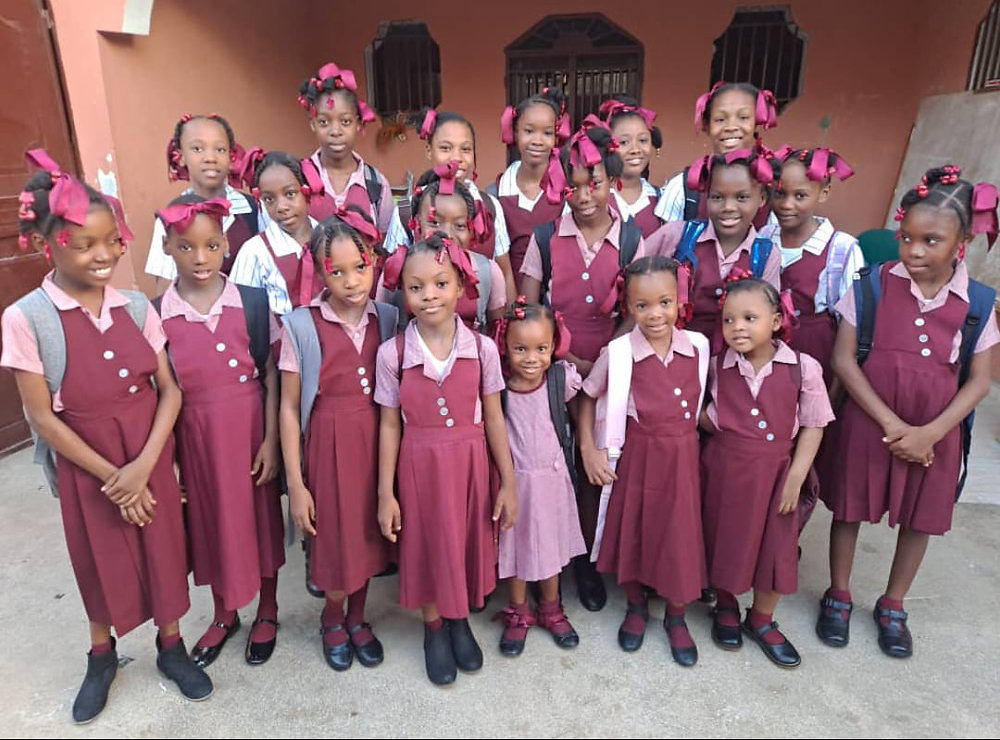Haiti's School System
At Restore Haiti, we often get asked questions such as, "Why is my sponsored student in Grade 5 when they are 13 years old?" or "Why is my sponsored student entering school for the first time at the age of 6?" or "Why has my sponsored student not graduated from primary or secondary education yet?"

Some of Restore Haiti's students on their first day of school this year
The school system in Haiti is very different than it is in North America and many other regions around the world. Developing countries must adapt to political, financial and other conditional factors, all of which contribute to a very different educational system and educational opportunities than what most of us are used to. Children don't automatically enter school at a certain age free of charge (as it is in Canada and the U.S.), moving from primary to secondary to post-secondary education in a linear fashion at timeframes consistent with what we're used to in North America. Children in Haiti are only able to enter school when, or if, they are financially able to do so, often resulting in a student entering the school system at a later age than the typical norm for school-aged children (or not at all).
Many families in Haiti are not able to afford sending their children to school, many need their children to stay home to help with household chores, the family business, or other family members, and many families face generational or geographical challenges that don't allow some families the basic human right and necessity of an education for their children. For these reasons, students may enter school but need to leave for a period of time, hopefully returning at a later date.
Sometimes it may take a student more than one attempt at passing a national exam(s) (which is required to move onto the next grade / education level) resulting in a student sometimes being in a class or area of academic study that does not seem to correlate with their age, as they may be required to repeat a grade or wait a period of time before attempting the exam again.
Haiti has recently adopted a new school system. The old system comprised of only two categories while the new system comprises of three.
OLD SCHOOL SYSTEM
Primary School - Students from 1st through 6th grade (official exam required to move onto the 7th grade).
Secondary School - Students from 7th through to the 13th grade. An official exam was required to move from secondary 3 (12th grade) into secondary 4 (13th grade) and students were required to pass another official exam to complete their secondary education.
NEW SCHOOL SYSTEM
A - KINDERGARTEN
Children may enter kindergarten from the age of two. The children graduate from kindergarten at six years old to enter their next level of education.
B - FUNDAMENTAL
First Cycle - Students from their 1st to 3rd year of level B education (regardless of their age, which may vary depending on their age of school entry that may have been delayed due to reasons outlined above).
Second Cycle - Students from their 4th to 6th year of education (regardless of age).
Third Cycle - Students from the 7th to 9th year (regardless of age). 9th grade students must pass an official exam to enter into the new secondary system.
C - NEW SECONDARY
New secondary includes four classes - secondary 1 (10th grade), secondary 2 (11th grade), secondary 3 (12th grade) and secondary 4 (13th grade). Students must pass an official exam to complete their secondary education. If they pass, they then have a choice between university and trade school.
Thanks to the generosity and kindness of the sponsors, donors, and funders of the students in our Sponsorship Program, we are able to send over 1,000 students to school. These students are able to receive a primary, secondary or post-secondary education, although at times not on what we might consider an age-appropriate timeline or through an educational system that is most likely very different than our own, but just as important for the future of Haiti's next generation and for generations to come.